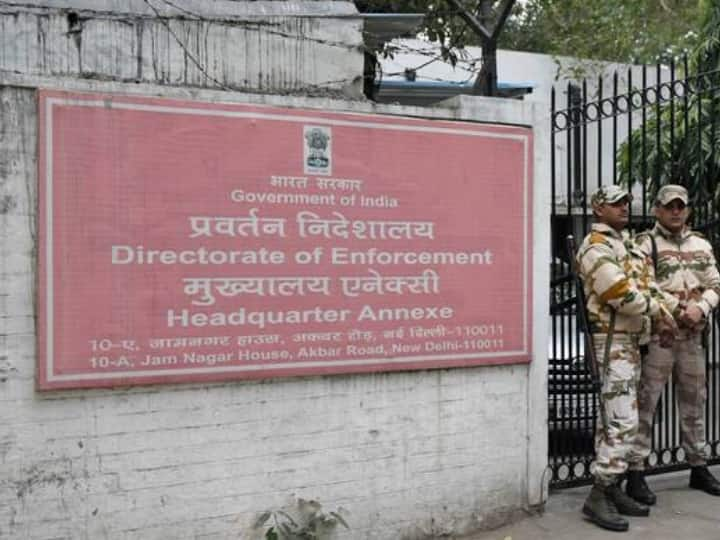[ad_1]
ED History Power and Authority: ED action is going on in many places in the country from Bengal to Maharashtra. The latest case is of Shiv Sena leader Sanjay Raut, on whom ED action is going on in connection with the Patra Chawl scam. At the same time, sacked Bengal minister Partha Chatterjee and his close aide Arpita Mukherjee are being arrested and interrogated in the school recruitment scam case. The opposition Congress is opposing the ED’s questioning of Sonia Gandhi and Rahul Gandhi in the National Herald case. The Supreme Court has upheld all the powers of the ED in the money laundering law. In such a situation, let us know what is Enforcement Directorate, what is its history, how it works and what are its rights.
ED is an organization under the Department of Revenue, Ministry of Finance, Government of India. Its headquarters are in Delhi, as well as its zonal offices in different cities of the country. Officers of the Indian Revenue Service, Indian Police Service and Indian Administrative Service are posted in the ED.
History of ED
When the country became independent from British rule, the Foreign Exchange Regulation Act was enacted in 1947. It was looked after by the Department of Economic Affairs, Ministry of Finance. Enforcement unit was formed in 1956. In this, the Department of Economic Affairs was formed. In 1957 its name was changed to Directorate of Enforcement or Enforcement Directorate which is also known as ED. In 1960, it was shifted to the Revenue Department and since then it has been working in the same.
In 1973, the Foreign Exchange Regulation Act of 1947 was amended and a new Act came. The economy of the country went up in the 90s. When foreign exchange came in large quantities, instead of regulation, there was a need for management. Then the Act was changed to Foreign Exchange Management Act 1991. When the Prevention of Money Laundering Act was enacted, the government decided that its enforcement would be done by the ED. In this, many people are deployed from outside also. Many people also come on deputation. In 2018, when the government saw that economic offenders were running out of the country in large numbers, the Fugitive Offenders Act was introduced. It was placed under ED.
ED works under these laws
ED mainly works under three laws. Under Foreign Exchange Management Act 1999 (FEMA. Prevention of Money Laundering Act 2002 (PMLA). Fugitive Economic Offenders Act 2018 (FEOA). ED investigates in Violation in Foreign Exchange under FEMA. PMLA to prevent money laundering or illegal assets involved in the case Created to seize the FEOA is designed to prevent economic offenders from fleeing India.
ED rights
CBI investigates on getting orders from the Centre, High Court or Supreme Court, apart from this, the permission of the state government is necessary in the case of the state but it is not so in the case of ED. When a case of misappropriation of Rs 1 crore or more is registered in a police station, the police inform the ED about it. After this, the ED can start the investigation by taking a copy of the FIR or charge sheet from the police station. Even if the ED comes to know about the case first, it can start investigation.
The ED investigates cases of FEMA violations, hawala transactions, foreign exchange violations, proceedings on any assets abroad and purchase of assets abroad. The agency has the powers of confiscation and arrest against those accused of money laundering. ED reserves the right to act on illegal acts done financially. Under PMLA, the ED has got the power to seize property, raid and arrest. The power of the ED can also be gauged from the fact that the agency can confiscate the property without questioning. The ED may or may not give reasons at the time of arrest. The statement given even before one of its investigating officers is considered as evidence in the court.
It is difficult to get bail in the arrest of ED. In FEMA and PMLA cases, ED can withhold bail of accused for three years. The ED can attach the properties of fugitive criminals and attach them to the central government. In view of the difficulty in the extradition of the fugitive, the ED has been given the right to attach his entire property. The ED also looks into cases of major financial frauds of export and import. If someone has kept a large amount of foreign currency with him or has done illegal trading of foreign currency, then the ED also investigates it.
Also read- Sanjay Raut ED Raid: Amidst ED raids at home, Sanjay Raut tweeted, saying – ‘Even if I die…’
What is money laundering?
According to former ED director Colonel Singh, there are three schedules in the Prevention of Money Laundering Act. These are called Schedule A, B and C. There are thirty Acts, in which there are 160 sections. These are called Schedule Offenses or Predicate Offenses. When investigation starts in Police, CBI, NIA, Income Tax Department, Custom Department etc. on these schedule offences, then later it is looked after by ED. When people try to launder money earned illegally, they try to make it legal, then this process is called money laundering. ED is looking into how the accused diverted the money. After checking it, the property is attached. If the attachment is found to be correct, the ED’s investigation goes ahead. Money laundering is punishable with imprisonment for a term which may extend to seven to 10 years, or with both imprisonment and fine.
Source link
